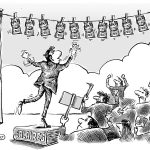Not enough arms
Does the rebound in employment in the US really reflect the overall state of the labor market??
The rebound in the US job market has been spectacular. And yet no one seems to be please with it. Or almost. In just a few months, the economic recovery has allowed the creation of
millions of jobs, and the return of the unemployment rate below the 6% threshold as early as May, whereas it peaked at more than 15% a year earlier. The structure of the labour
market, the absence of part-time employment protection measures (as in Europe), led to such a surge, then its quick deflation, while the Federal State and the local authorities
supported households through the distribution of cheques complementary to income, and the extensions of the periods of unemployment coverage. To the point of threatening the
flexibility of the US labour market? Some already think so and blame the new Administration for it.
The Federal Reserve Beige book, the preparatory document for its monetary policy meeting on 15th and 16th June next, reports that several sectors are struggling to recruit. This is
particularly the case for hotels and restaurants, as well as road transportation, (the latter sector was already experiencing a shortage before the pandemic). More skilled jobs in
commerce are also lacking. The manufacturing sector is even on the verge of having to reduce production due to a lack of hiring. Employment bonuses are multiplying, as are
increases in minimum wages and pushing prices in the face of ever-pressing demand.
The situation is similar in Europe, where the issues of returning to work also arise.
The fear of the pandemic, or its consequences still perceptible, but above all the prolongation of unemployment aid, would be responsible for these shortcomings, and if
some States – with a Republican majority – have already limited them, half of them will continue them until July, allowing, according to observers, the least qualified employees to
arbitrate between employment and benefits.
Yet other phenomena are at work. Thus, the aging of the population is "taking" generations of boomers out of the labour market, who will not return to it, while new market entries are
diminishing. Thus, the participation rate of the US workforce has fallen to 61.4%, from 63.5% before the pandemic – an already low threshold compared to the years before the subprime
crisis. The situation seems quite similar in Europe, where the unemployment rate certainly did not explode last spring, thanks to job preservation and short time working measures, but
where the issues of returning to work and the flexibility of the labour market also arise. Undoubtedly, the rebound in employment reflects the special nature of the current
recession, linked to the shock of the pandemic, and the scale of public interventions to deal with it.
Recent successes in tax cooperation seem modest, if not irrelevant.
However, this is not a general phenomenon, either for the sectors of activity or in all countries. The projected image of America, however powerful and influential it may be in
the markets, is not the whole reality, which turns out to be much more contrasted. According to ILO 1 , in its latest report, the Covid crisis has had dramatic consequences on
employment and continues to weigh on regions still poorly covered by vaccination in particular, and whose populations are much less protected. As a result, many seasonal and
migrant workers have been unable to cross borders. Women have been particularly affected, as have the youngest after leaving school. So-called informal workers (more than 2 billion
people according to the Organization) have been three times more affected and left without much help around the world. According to the Institution, the employment deficit will still be
75 million this year and 23 million next year. Jobs and skills lost, low productivity of jobs regained, loss of income for the poorest, the ILO paints a picture of a post-pandemic period
in which inequalities have increased, and in which the inadequacy of supply and demand and the persistence of high unemployment could lead to major social tensions.
In the face of these emergencies, recent successes in tax cooperation seem modest, if not irrelevant. The rebalancing of global labour markets will require global aid, particularly in the
field of education, but also the reopening of borders.
1 ILO, International Labour OfficeOrganization
Original version in French language in Swiss Financial Website www.allnews.ch Cartoon by Barret



